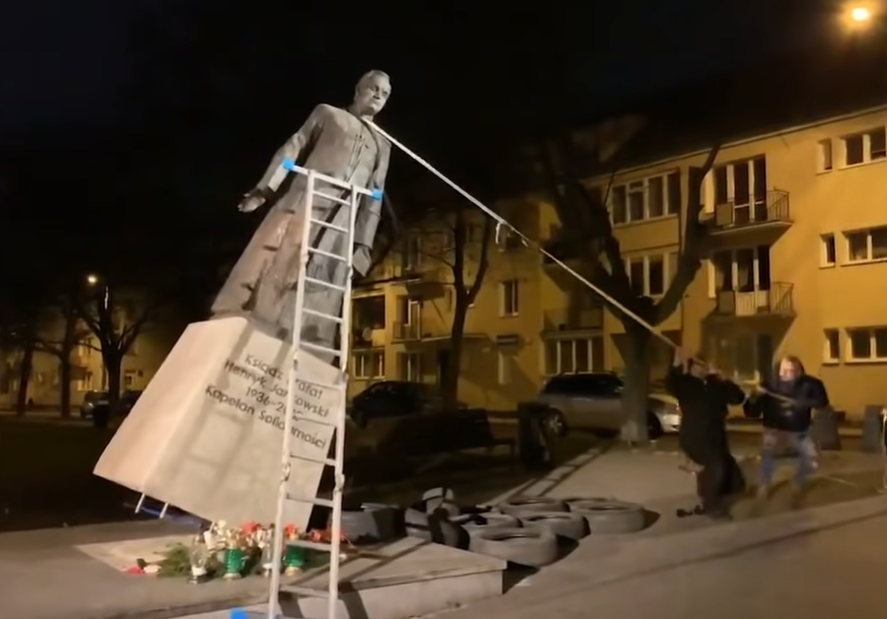Three men who toppled a statue of a priest accused of sexually abusing children have been acquitted on appeal, overturning a previous lower-court verdict that found them guilty of damaging the monument.
The incident in question took place in February 2019, when three activists pulled down the statue of Henryk Jankowski, a Catholic priest who had been the chaplain of the Solidarity movement that fought to free Poland from communist rule in the 1980s.
In 2003, Jankowski was accused of sexually abusing a child, but prosecutors eventually discontinued the case. In late 2018 – eight years after Jankowski’s death – further alleged victims of the priest came forward.
After local officials in Gdańsk refused to take down a statue honouring Jankowski, three activists, Michał Wojcieszczuk, Rafał Suszek and Konrad Korzeniowski, decided to topple the statue themselves. They filmed the incident and later called the police to notify them about their actions.
Last night, activists in Gdańsk pulled down the statute of former Solidarity-associated priest Henryk Jankowski, who has been the subject of mounting allegations of sexual abuse of minors. https://t.co/3oqXrZZxF7
— Notes from Poland 🇵🇱 (@notesfrompoland) February 21, 2019
Prosecutors indicted the men for their “hooligan” actions, and last year a court found the three guilty of damaging the monument. However, it chose not to impose any punishment on them due to the “low social harmfulness of the act”, reports Gazeta Wyborcza.
That verdict was appealed, and yesterday it was overturned in a binding ruling by the district court in Gdańsk. Justifying her decision to acquit the defendants, judge Anna Czaja said that the court did not see their actions as involving the “groundless damage or destruction of a monument”, reports TVN24.
“The removal of the statue was carried out not by violent destruction”, but in a controlled way using ropes and clamps, said the judge, who also noted that tyres had been laid out to cushion the fall of the monument.
She also found them not guilty of insulting a monument – a crime in Poland – saying that they had acted within the legal bounds of freedom of expression. “Monuments placed in public spaces are subject to judgment and evaluation,” wrote the judge.
In her justification, Czaja cited the testimony of an auxiliary accuser, Jerzy Borowczak, an MP from the Civic Platform (PO) party, who had been one of the co-financiers of the creation of the monument.
During his testimony, Borowczak said he had felt aggrieved by the action only in a material sense and that if he had “had information about his [Henryk Jankowski’s] character, his decision to co-finance the monument would not have been so obvious”, the judge said.
Shortly after the toppling of the monument, the activists published a statement in which they wrote that:
this simple physical act expresses our cultural and civic disagreement with the presence in public space of evil personified, contempt for and objectification of another human being, violation of their freedom and privacy, psychological terror, disrespect for the pain and anger of victims, and, finally, hate speech, as well as the idolatrous worship of people who, like Henryk Jankowski, are the bearers of these attitudes and the perpetrators of similar acts and behaviours.
The monument was re-erected just two days later by employees of the Gdańsk shipyard, where Solidarity emerged. However, two weeks later it was officially dismantled following a resolution by Gdańsk city council, who also stripped Jankowski of his honorary citizenship of the city.
However, in 2019, Jankowski’s three surviving sisters sued the publisher of Gazeta Wyborcza, the newspaper that had published claims of abuse by the priest, saying the “publication violated the true and good memory” of their brother.
Recent years have seen a growing number of cases of child sex abuse in Poland’s Catholic church come to light, as well as evidence of negligence in dealing with the issue by bishops, a number of whom have been punished by the Vatican as a result.
In 2020, in a landmark decision, the Supreme Court upheld a ruling ordering a Catholic religious order to pay one million zloty in compensation to a woman who was repeatedly abused by a member of the order.
Last month the diocese of Toruń was ordered by a court to pay 600,000 zloty compensation to a man who was sexually abused by a priest for almost a decade when he served as an altar boy.
Main photo credit: YouTube (screenshot)

Alicja Ptak is deputy editor-in-chief of Notes from Poland and a multimedia journalist. She has written for Clean Energy Wire and The Times, and she hosts her own podcast, The Warsaw Wire, on Poland’s economy and energy sector. She previously worked for Reuters.




















